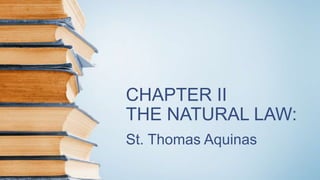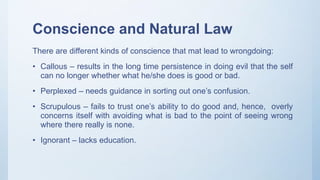This chapter discusses St. Thomas Aquinas' theory of natural law. It introduces Aquinas, who was an Italian Catholic priest in the 13th century. Aquinas believed that natural law is an imprint of divine will on humanity, guiding people towards goodness. He saw conscience and reason as important for making ethical decisions and living according to natural law. The chapter also discusses how Aquinas' view of natural law emphasizes our relational nature and finding perfection through love of God. While his ethics were based on religious beliefs, his emphasis on a universal moral order continues to influence philosophy and legal theory today.























